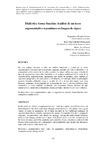Dialéctica forma-función: Análisis de un texto argumentativo espontáneo en lengua de signos

Use this link to cite
http://hdl.handle.net/2183/38020
Except where otherwise noted, this item's license is described as Licencia "Reconocimiento - NoComercial – Sin obra derivada (BY-NC-ND)"
Collections
- Investigación (FFIL) [877]
Metadata
Show full item recordTitle
Dialéctica forma-función: Análisis de un texto argumentativo espontáneo en lengua de signosAuthor(s)
Date
2019Citation
Morales López, E., Boldú Menasanch, R. M., Asta García, M. y Garrusta Ribes, J. (2019): “Dialéctica formafunción: Análisis de un texto argumentativo espontáneo en lengua de signos”. Revista de Estudios de Lenguas de Signos REVLES: Aspectos lingüísticos y de adquisición de las lenguas de signos, Morales López, E. y Jarque Moyano, M. J. (eds.), 1: 126-149.
Abstract
[Resumen] En este trabajo llevamos a cabo un análisis funcional y formal de un texto
argumentativo, realizado por una persona signante, grabado en vídeo y difundido a la
comunidad sorda a través de las redes sociales. La autora utiliza una gran variedad de
tipos de argumentos, todos ellos incluidos en el catálogo tradicional de la teoría de la
argumentación: principalmente, argumentos por medio de ejemplos, pero también un
argumento pragmático, de causa-efecto y, finalmente, por analogía. Entre los principales
recursos formales utilizados están el cambio de rol y el uso del espacio con locus
diversos; asimismo, el uso repetido de la estructura de foco, y del foco enfático y foco
contrastivo, a veces también combinado con estructuras léxicas diversas de tipo
enumerativo y paralelístico; finalmente, destaca el tópico discursivo con valor cohesivo. [Abstract] In this work we analyze an argumentative text, made by a signer, recorded in video and
disseminated to the deaf community through social networks. The author uses a great
variety of types of arguments, all of them included in the traditional catalogue of
argumentation theory: mainly, arguments by means of examples, but also a pragmatic
argument, of cause-effect and, finally, by analogy. Among the main formal resources
used are role change and the use of space with diverse locus; also, the repeated use of
the focus structure, and of the emphatic and contrastive focus, sometimes combined with
diverse lexical structures of a enumerative and parallelistic type; finally, the discursive
topic with cohesive value stands out.
Keywords
Texto argumentativo
Tipos de argumentos
Relación forma-función
Foco contrastivo
Cambio de rol
Argumentative text
Types of arguments
Form-function relationship
Contrastive focus
Change of rol
Tipos de argumentos
Relación forma-función
Foco contrastivo
Cambio de rol
Argumentative text
Types of arguments
Form-function relationship
Contrastive focus
Change of rol
Editor version
Rights
Licencia "Reconocimiento - NoComercial – Sin obra derivada (BY-NC-ND)"
ISSN
2695-4133






